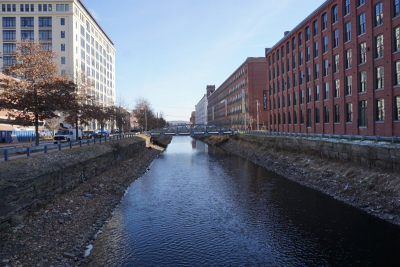The Lawrence Textile Strike, also known as the Bread and Roses Strike, was a strike of immigrant workers in Lawrence, Massachusetts, in 1912 led by the Industrial Workers of the World (IWW). Prompted by a two-hour pay cut corresponding to a new law shortening the workweek for women, the strike spread rapidly through the town, growing to more than twenty thousand workers and involving nearly every mill in Lawrence. On January 1, 1912, the Massachusetts government enforced a law that cut mill workers' hours in a single work week from 56 hours, to 54 hours. Ten days later, they found out that pay had been reduced along with the cut in hours.The strike united workers from more than 51 different nationalities many of whom knew little to no English. A large portion of the striking workers, including many of the leaders of the strike, were Italian immigrants. Carried on throughout a brutally cold winter, the strike lasted more than two months, from January to March, defying the assumptions of conservative trade unions within the American Federation of Labor (AFL) that immigrant, largely female and ethnically divided workers could not be organized. In late January, when a striker, Anna LoPizzo, was killed by police during a protest, IWW organizers Joseph Ettor and Arturo Giovannitti were framed and arrested on charges of being accessories to the murder.IWW leaders Bill Haywood and Elizabeth Gurley Flynn came to Lawrence to run the strike. Together they masterminded its signature move, sending hundreds of the strikers' hungry children to sympathetic families in New York, New Jersey, and Vermont. The move drew widespread sympathy, especially after police stopped a further exodus, leading to violence at the Lawrence train station. Congressional hearings followed, resulting in exposure of shocking conditions in the Lawrence mills and calls for investigation of the "wool trust." Mill owners soon decided to settle the strike, giving workers in Lawrence and throughout New England raises of up to 20 percent. Within a year, however, the IWW had largely collapsed in Lawrence.The Lawrence strike is often referred to as the "Bread and Roses" strike. It has also been called the "strike for three loaves". The phrase "bread and roses" actually preceded the strike, appearing in a poem by James Oppenheim published in The American Magazine in December 1911. A 1915 labor anthology, The Cry for Justice: An Anthology of the Literature of Social Protest by Upton Sinclair, attributed the phrase to the Lawrence strike, and the association stuck.A popular rallying cry from the poem that has interwoven with the memory of the strike:
As we come marching, marching, we battle too for men,
For they are women's children, and we mother them again.
Our lives shall not be sweated from birth until life closes;
Hearts starve as well as bodies; give us bread, but give us roses!
James Oppenheim
Lawrence is a city in Essex County, Massachusetts, United States, on the Merrimack River. As of the 2020 census, the city had a population of 89,143. Surrounding communities include Methuen to the north, Andover to the southwest, and North Andover to the east. Lawrence and Salem were the county seats of Essex County, until the Commonwealth abolished county government in 1999. Lawrence is part of the Merrimack Valley.
Manufacturing products of the city include electronic equipment, textiles, footwear, paper products, computers, and foodstuffs. Lawrence was the residence of poet Robert Frost for his early school years; his essays and poems were first published in the Lawrence High School newspaper.

1912Jan, 11
Immigrant textile works in Lawrence, Massachusetts, go on strike when wages are reduced in response to a mandated shortening of the work week.
Choose Another Date
Events on 1912
- 6Mar
Airship
Italo-Turkish War: Italian forces become the first to use airships in war, as two dirigibles drop bombs on Turkish troops encamped at Janzur, from an altitude of 6,000 feet. - 15Apr
Sinking of the RMS Titanic
The British passenger liner RMS Titanic sinks in the North Atlantic at 2:20 a.m., two hours and forty minutes after hitting an iceberg. Only 710 of 2,227 passengers and crew on board survive. - 14Oct
Theodore Roosevelt
While campaigning in Milwaukee, the former President of the United States, Theodore Roosevelt, is shot and mildly wounded by John Schrank, a mentally-disturbed saloon keeper. With the fresh wound in his chest, and the bullet still within it, Mr. Roosevelt still carries out his scheduled public speech. - 17Oct
First Balkan War
Bulgaria, Greece and Serbia declare war on the Ottoman Empire, joining Montenegro in the First Balkan War. - 26Oct
Thessaloniki
First Balkan War: The Ottoman occupied city of Thessaloniki, is liberated and unified with Greece on the feast day of its patron saint Demetrius. On the same day, Serbian troops captured Skopje.

 English
English  español
español  français
français  português
português  русский
русский  العربية
العربية  简体中文
简体中文 